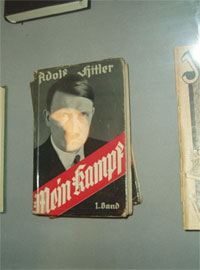Herr Bardorf's Story
Life in Berlin During the War
WW2 Home | The Home Front
In the time of my birth we had great economical depression worldwide. In Germany, after the loss of 1st World War, we had a great inflation, where many people lost their money and a democracy with many faults and a bad constitution. The Nazis and the Communists fought their street battles in our district. So when Hitler came to power and these fights ended, my father and many others were enthusiastic about the peace and the new ideas.
 The
Nazi idea had a name 'Volksgemeinschaft', all people work together for
the same target. With some exceptions, no Jews, no gypsies, no
homosexuals, no freemasons, no religious or political opponents. With a
lot of propaganda, pressure, political content and police and newspapers
were forced into the line. Hitler was different from other 'dictators';
he had written a book, 'Mein Kampf', everybody bought it. In this book
- as far as I know - we can find Hitler's ideas of anti-Semitism and
military revenge. Hitler had success in the first seven years. He
regained the Saardistrict; Austria; Czecia, tolerated by France and GB
and districts in the East. Then he began the war with Poland with all
the consequences. I think the boys were enthusiastic about the war up to
the point where the war began. But the military successes in Poland,
Scandinavia and France allowed them to forget their fear and believe
that Hitler was the greatest commander of all times. Many hoped the war
would end after these victories.
The
Nazi idea had a name 'Volksgemeinschaft', all people work together for
the same target. With some exceptions, no Jews, no gypsies, no
homosexuals, no freemasons, no religious or political opponents. With a
lot of propaganda, pressure, political content and police and newspapers
were forced into the line. Hitler was different from other 'dictators';
he had written a book, 'Mein Kampf', everybody bought it. In this book
- as far as I know - we can find Hitler's ideas of anti-Semitism and
military revenge. Hitler had success in the first seven years. He
regained the Saardistrict; Austria; Czecia, tolerated by France and GB
and districts in the East. Then he began the war with Poland with all
the consequences. I think the boys were enthusiastic about the war up to
the point where the war began. But the military successes in Poland,
Scandinavia and France allowed them to forget their fear and believe
that Hitler was the greatest commander of all times. Many hoped the war
would end after these victories.
For many boys, I was 10, war was a great adventure. The propaganda films cut out the bloody side of war. We read booklets about heroes and played with military toys. The first battle Germany lost in the war was the Battle for England. The attempt to bomb Great Britain was stopped after a great number of German Bomber planes were lost. Hitler needed these Bombers in other places, in Africa, on the Balkan and after 1941, in Russia.
In the beginning of the war H. Gring, the commander of the German Air Force said "I will be called Meyer if any British planes reached Berlin." Shortly after he was as the British planes were through and bombing Berlin and in 1940 the British started their air-raids. Our air-raid shelters were often built in the cellars of our houses. We had chairs and tables and beds, the ceiling of the cellar was supported by wooden pillars. The rooms under the roof were emptied and painted with a fire stop colour. On the stairs and landings stood buckets of water and sand to extinguish the fire-bombs.
1942 was a relatively quiet year for bombings, but in 1943 the RAF started using modern bombers such as the Lancaster and the Halifax. Also, during the day the Americans came with their Liberators and the Flying Fortress. These air-raids were very effective and destroyed many cities in Germany beginning with Hamburg, Colon and Berlin. Any bombings of civilian places such as Dresden and Potsdam were used by the Nazis to distract the people from the Nazis own crimes. In the war it was much easier to arrange the Holocaust, people believed that the Jews were being kept in ghettoes in the east for their own safety. I was also led to believe from books that I read that Jews were our enemies and that they needed to be contained in these Ghettoes whilst the conspiracy was dealt with by the Germans.
When the air-raids increased in 1943, I and the rest of my school was sent to a part of Poland, the province Posen-Poznan belonging at the time to Germany. We stayed there until January 1945 when the Soviets marched west without a stop to the River Oder. We had great luck to be transported by a train out of this area. Most of the German population fled with horses and wagons. Many froze or died under Russian tanks. But I was also lucky not to be in Berlin when the war ended as the occupation of Berlin was marked by many losses on both sides. The Volsstturm was the last contingent, a troop of old men and teenagers down to 15 years who had to fight against the Soviets. Hitler had ordered that anybody who deserted would be hung without a trial and so they hanged many boys of my age.
We had trusted Hitler for too long and after the war we felt like losers. It took a while to realise that we had been freed from a nightmare. In this context I remember very positively our British Education Officer coming to our classroom in 1947 and telling us about the V2 Bomber attacks on London. It was the first time we saw the war from the other point of view.
Many people ask me how it was not possible to stop Hitler. Propaganda worked over the radio, there was no TV or any worldwide communication. It was strictly forbidden to hear the German programme from the BBC. Anyone doing so would be sent to a concentration camp.
My brother was two years older than me. He was tall and at the age of 14 he joined the Airmans-Hitlerjugend and got 4 examinations in gliding planes. He rose up to be a leader. After the war he was betrayed by his own school headmaster to the Soviet NKWD and he died in a concentration camp before he reached his 18th birthday.
WW2 Home | The Home Front
Page last updated: 25th February 2014
